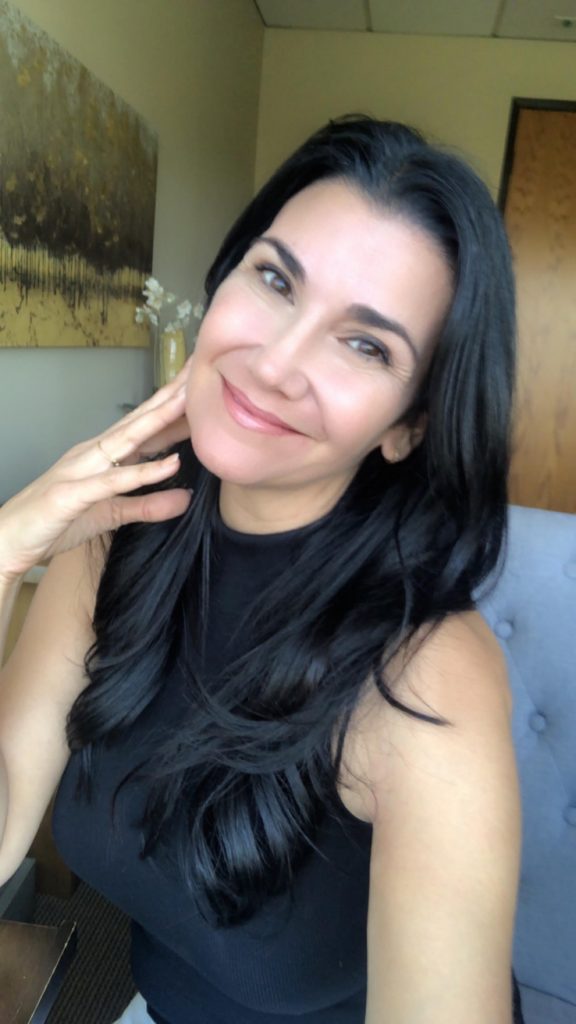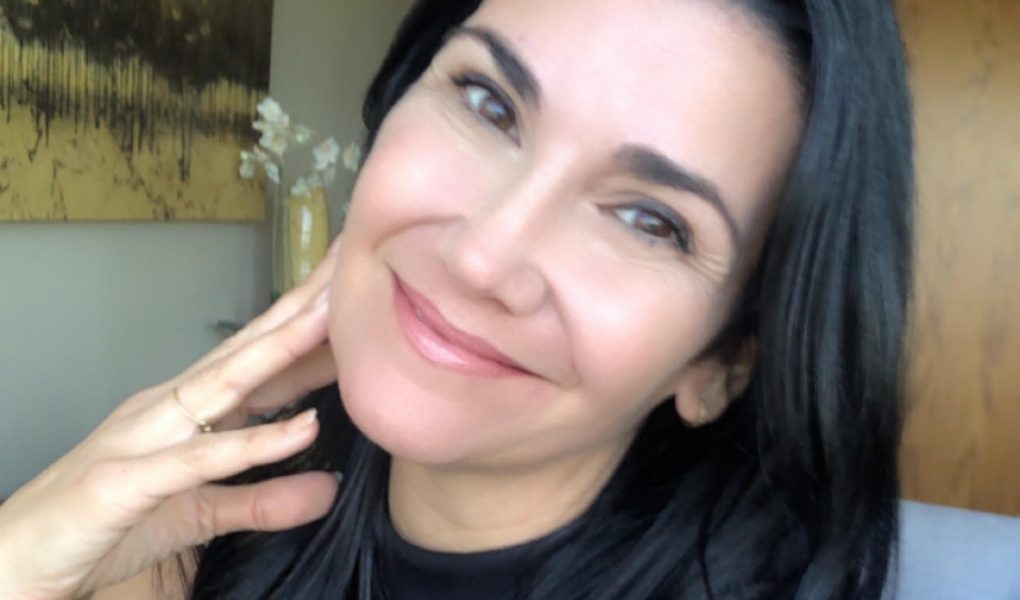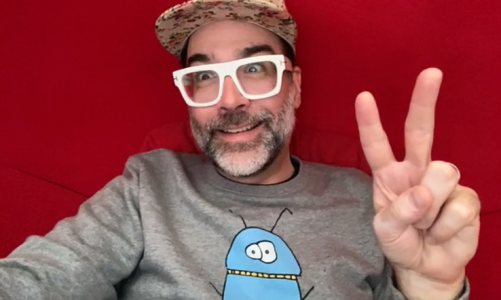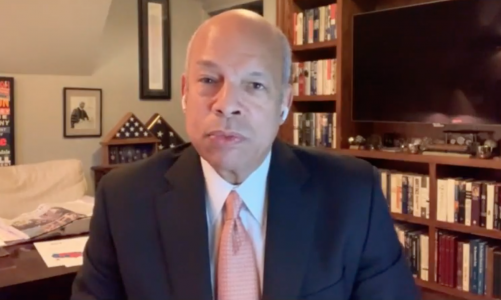
Originally a high school mathematics teacher, Lisa Smith is currently a licensed marriage and family therapist (LMFT) and eye movement desensitization and reprocessing (EMDR) trained trauma specialist. When Smith is not working with clients in her private practice, she posts short-and-long-form videos on her social media accounts about topics related to dating, relationships, attachment, and trauma. Her TikTok account, YouTube channel, and podcast titled “So My Mom’s a Therapist” have a combined following of nearly 600,000.
Danielle Springer: Why did you start a TikTok account to talk about dating and attachment? What kind of gap were you noticing in the dating discourse on social media?
Lisa Smith: It was all by accident. I never wanted to brand myself or my private practice. I’m actually very private about my private practice, because I really like what I do, and I’m fortunate to be able to support myself doing it.
But I was leaning over the shoulder of my youngest child who was watching a TikTok video of this 20-year-old giving advice such as, “These are three things you need to do on a first date.” And I was like, “What is this shit?” It was not the kind of advice I would give, so I decided to make a video with good advice. I was surprised that people kept watching, because I’m not doing entertainment. I’m not all angry. I’m very even-keeled. But as long as my videos are enjoyable, and they add value, I will keep showing up and making them.
You mentioned that you didn’t like what other dating coaches or influencers were saying about dating. Can you elaborate on what particular things you didn’t like and how your approach to dating is different?
Going about dating as a recipe and saying,“you need to follow these steps” doesn’t work. Relationships are complicated. That approach is going to appeal to people — particularly women — who are very successful in life. They’re used to being able to say, “Just tell me what to do, and I’ll do it and get the results I want.” But relationships work differently, so you have to go about it differently.
I think giving very prescriptive advice will end up making you more frustrated and angry at the other person. You have to take a different approach: take the weight off of it and enjoy the experience of dating. Going in wanting an end product makes you not act normal on the first date. You’re anxious; you’re trying to get answers. You’re wondering, “Will they like me? Are they going to be attracted to me?” So you’re trying to put on this face, and at the same time, you’re trying to get answers to what you want. That’s complicated. Originally I joked that we need to create a “sip and lip gang,” where you just get a drink, make out with someone, and have a little fun.
But there seems to be a dichotomy: on social media, I see a lot of influencers and dating coaches with very rigid rules around dating. And then on college campuses, I see the opposite: this casual, “go with the flow” situation. Where along this spectrum is the ideal dating situation?
You’re right. On college campuses, it is more casual. Casual is not bad if casual is what you want. But people have to figure out what they’re okay with. If you are getting casual in hopes of getting a relationship eventually, that’s where you get stuck. Oftentimes we’ll let it be more casual, or we’ll have physical intimacy or sex, hoping that we get a relationship too, but it rarely ends up working out.
We need a balance. I don’t think the rigid rules are going to help, but I don’t think the casual hookups are going to help either. We have to try to find this middle ground that says, “Let me make sure that [the person that I’m seeing is] consistent.” Part of this comes with age: that is, this ability to say, “This is casual. You’re texting me for a few days and then you disappear for a few days. I’m not okay with that. Next!” as opposed to, “Oh, but they’re cute and I’m going to hold my breath and hope that I’m what they want.” What our body really wants is consistency.
It seems like a lot of people want the intimacy of a relationship but don’t want the pressure of having a lot of labels. But eventually, one person is going to want the labels and the relationship. And a lot of people really do tie their self worth to these relationships. You make it the other person’s fault when they don’t want the same thing as you, rather than just saying, “We just want different things.”
What you described is something I see so much with my clients that are in college. I’m like, “Okay, so you’re cuddling with them, you’re making out, you guys are getting naked, but you’re not a ‘thing’?” And they’re like, “Oh, yeah, we don’t want a relationship.” A lot of the actions will be what I call “girlfriend-boyfriend” behavior – without that label. They can call it whatever they want, but if they were in a relationship, what exactly would look different? What would that label give? For some people, that label feels like they’re now “locked down.” So it’s almost like they have one foot in and one foot out. Most times, one person is hoping the other person will eventually put both feet in. And that’s where I say [if you want a serious relationship], you have to watch with your eyes, because [this kind of casual relationship] works for [the other person]. If it didn’t work for them, they wouldn’t be doing it. If they wanted something different, they would be doing it.
If the beginning stages of dating should be fun and light, when is the right time to ask what the other person’s intentions are? And when it becomes clearer that you’re not on the same page, when is the right time to leave?
This is an important piece: there is no specific timeline. This is why I’m not a big fan of dating coaches and relationship experts who say, “You need to leave by two years if they haven’t put a ring on your finger.” And I’m like, “I’m sorry, are you in the relationship?” That may work or not work for you, but it may work for that person. The key is that you have to check in with yourself and say, “Am I okay with the way this looks?” If the answer is “Yes, I’m okay. I’m not sure if I’ll be okay in a few weeks, but I’ll check in a week and see if this works for me.” If the relationship is causing you more stress, and you’re in your head trying to figure it out, it would probably be a good time to have that conversation.
It’s not needy to have needs. It’s not needy to be able to use what feels good in our body as a barometer. If we’re getting naked with someone, it’s okay to ask, “Are we willing to clear the pond?” Meaning that we’re not talking to other people, we’re not dating other people, and we’re not on dating apps. It is absolutely reasonable to ask someone you’re sleeping with and spending time with to clear the pond. But this is where the fear is: “If I say that, they may walk away or shut down. Or I may lose them.” But if you lose them over that, then you’re going to lose them anyways. It’s just a matter of time.
Why do people struggle to end these casual relationships when it is not what they want?
If we tie our self worth to relationships, we won’t be willing to let go. There’s a difference between, “This has to do with who I am and if I’m lovable and desired,” and “It’s not a good fit.” If it’s about fit, then you can say, “No, I’m not putting up with this shit.” You’re onto the next person. But if me being desirable or somebody wanting me is tied to it, then I’ll try to make it work more, and I’ll put up more with casual.
You mentioned the concept of paying attention to one’s body in relationships. Can you elaborate on this concept?
We have to think of our cognitive system (our brain) and our nervous system as speaking two different languages – almost like there are two different people inside of our body. This is why sometimes you will find yourself doing something and think, “I have no idea why I’m doing this.” We want to build a relationship between our brain and our body, because oftentimes, our body will be freaking out and our brain is not connected. [But if our brain and body were connected, our brain would say to our body], “We can tell you are on alert. You just bumped out of your zone. How do we calm you down?” So you step in and parent yourself. Our nervous system and our emotions are like wild stallions, and our job is to put reins on them and manage them.
But when people have had a lot of trauma, often it is as if a cord has been cut. Their body is not a safe place for them; they’ve worked really hard not to feel and not to be in their body. And I’m actually trying to get people to move toward their body. That is a process that I would encourage people to do along with the therapist or psychologist, if the body is not even a safe place to be or to feel.
How can you tell if that anxiety you are feeling is “normal” in a dating situation or whether it is due to being in the wrong kind of relationship for you?
If you are dating, you’re going to go into environments that are anxiety producing. And so we’ve got to approach dating as practicing and learning as we go. The more you learn the skills to regulate your body, the better you can get yourself to a regulated state. And when you’re in a regulated state, you can look at the other person and say, “I’m not sure I’m okay with that behavior.” Once you’ve calmed your body down, you’re able to look clearly at the other person’s behavior. If the anxiety is truly about the other person’s behavior, [the anxiety] will stay, even in a regulated state.
What are some tangible ways to regulate your body in a dating situation?
You can get your body calm through things like taking some deep breaths. You set up all these things to do in those moments. I’ve talked a lot about what to do when you don’t hear from somebody in dating — it bumps you out of your zone. This is when you should say “Okay, I need to put my phone away. I need to go for a walk. I need to go for a run. I need to watch a show.” Do things that get your body calm.
This is a key part: get that support around you. Have one or two trusted friends whose advice you really admire. Ask them, “Hey, can I bounce something off you? They went M.I.A the other night, and they’re telling me how I’m so special, I’m so different, and yet they completely disappeared for the night.” And the friend could be like, “That’s not okay.” But if you really like the person, you aren’t supposed to see clearly. You’re supposed to think, “Oh, they’re cute, and I like them, and they kiss so well!” So you need outside eyes on it. The goal here is working on regulating your body and getting objective eyes around you; that’s the combination we’re working on.
Why do people seem to create different narratives about why the person they’re seeing hasn’t been as communicative or consistent?
When you get caught into what the other person is doing, you’re projecting into the unknown. Our brain does not like unknowns. So if they disappear but you see that they’re active online, your brain is filling in for an unknown. When we ask, “What am I doing wrong? Why are they not texting me back?” it becomes about our worth again. You will fill in and create a narrative based on what has been hurtful or what’s a threat in your history. So, for instance, if you’ve been cheated on in the past, and the other person goes absent, you’ll be like, “They’re with another girl.” The bottom line is: it doesn’t matter what they’re doing. Ask, “Does this behavior work for me?” It’s much more empowering; it’s a grounded feeling in our bodies.
You recently released a podcast episode about not being able to make someone change. How do you communicate your expectations without trying to force someone to change?
When [the other person] shows up and is not doing what you want them to do, it’s because they’re not matching this false image that you have of them. If you are really frustrated with somebody, you want to recognize that this is who they are. Yes, we all grow and change, but we don’t marry potential. We marry what’s in front of us right now. And especially when we’re young, there’s an unspoken sense that we’re going to grow up and the other person will just magically know how to do finances, and run a home, and step in.
You have images of two different people. You have your fantasy image of them, and you have the real them, and you will rip up one of them. You either will not let go of the ideal, and you will rip up the reality of the other person. Meaning you will criticize them, because you will not let go of your expectations. Or, you can start to learn how to rip up your expectations and almost mourn them like a loss of that person and say, “This is what I have in front of me. Does this work for me?” It doesn’t mean that you have to be okay with their actions. The problem, though, is we very rarely take a really good look at what’s in front of us. Why? Because our eyes are still on the fantasy version of that person. That’s why we’re frustrated.
Why does this seem especially difficult for people who have been single for a long time?
When you talk about someone who’s been single for a very long time, they will talk about a relationship coming in and robbing them of their peace. The peace was there because it was only you, and you have full control of that. A relationship is going to feel a little tumultuous, especially if you’ve been single for a long time, because you don’t have control over the other person.
But this is the definition of growing: increasing my ability to tolerate being uncomfortable. And in a relationship, you will have to learn to grow. They’re going to tick you off. They’re going to leave their clothes on the floor of your pristine apartment. We tend to tolerate the mistakes in ourselves more than we tolerate the mistakes in somebody else. And that’s because you expect to be able to control the other person. But you have to let go of control in a relationship.
A lot of these people who are single for a while get so stuck in their comfort zone that they stop accepting that the other person you’re dealing with is a human being with their own lives and their own needs and desires. And you’re trying to force them to fit into your own puzzle piece. Somebody who’s been single a long time likes the idea of a relationship but the actual relationship is another beast. In a relationship, there has to be room for two people. We want two full people in a relationship.
What is one thing that gives you hope for the future?
What gives me hope is that, underneath the anger and bitterness I see on TikTok, I see that there is this humanity where people just show up and love. When we talk in abstracts, whether it is in gender or race, it breeds anger, bitterness, and division. When we talk at the individual level, we see love. As long as I still see people showing up and loving other people — that’s what gives me hope. I feel like everybody is given a platform in their life and my platform is to simply love.
I always say be kind, because you have no idea what people are going through. I say it because one of the things that saddens me in this world is that I see a lot of people demonized in the media. We lose humanity when we do that. These are real people with real lives. If everybody just was kind, that, to me, would make such a difference.
*This interview has been edited for length and clarity.




